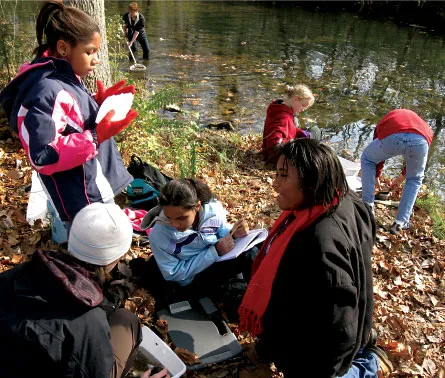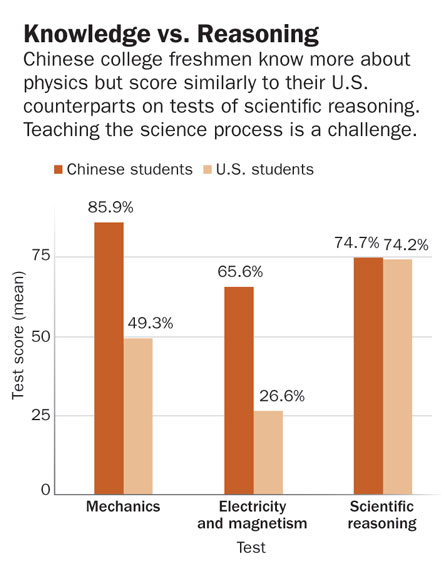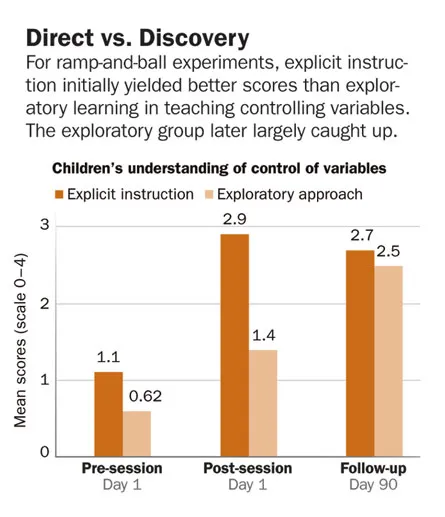Think like a scientist
A class of curious sixth-graders arguing over moist, mucky jars may represent the future of science education
Fresh-faced researchers swarm around Deborah Lucas, buzzing with enthusiasm and frustration. They have gathered to appraise terrarium-style models of a local pond ecosystem that groups of two or three have painstakingly assembled in large jars. Lucas leads a discussion that includes how to determine the causes of unanticipated die-offs of plants and animals in some jars, what hypotheses to test in sustainable models, the usefulness of quantitative measures of plant growth devised by some teams, and the extent to which each model corresponds to an actual pond ecosystem.
Despite having launched ambitious projects, none of the assembled investigators will publish research papers or present posters at scientific meetings. Cut them some slack — they’re sixth-graders. Deborah Lucas is their teacher.
These 11- and 12-year-olds are getting anything but a typical grade school science education. And that suits them just fine. Lucas’ class vividly illustrates how research exploring links between everyday thinking and scientific reasoning is inspiring novel efforts to teach young people how to think like scientists.
From this perspective, kids don’t truly grasp how science works by carrying out prefabricated science experiments that come packaged in kits, a common practice in U.S. science classes. It’s certainly important to learn scientific formulas and principles by heart. But a deeper mode of learning depends on kids getting their hands dirty and their minds engaged in original research projects. General reasoning skills, such as switching one’s point of view, and science-specific strategies, such as testing a hypothesis about one variable by holding other variables constant, blossom together in this atmosphere.
“Scientific reasoning skills lie on a continuum with mundane abilities, including making analogies, reasoning visually and mentally simulating an unseen process,” says cognitive scientist Nancy Nersessian of the Georgia Institute of Technology in Atlanta. Nersessian studies how teams of scientists achieve technical advances and theoretical insights in disciplines such as engineering and neuroscience.
Make no mistake, original research isn’t easy — ask any scientist. But it’s not boring, either. Neither ecological disasters nor dead-end hypotheses can deter sixth-graders who have a personal stake in a science project.
Lucas, a public school teacher and education researcher at Vanderbilt University in Nashville, collaborates with Vanderbilt psychologists Richard Lehrer and Leona Schauble. The three study ways to teach young students how to reason about science and mathematics by constructing models of real-world physical and biological systems. Lucas and her colleagues also train teachers in this approach to science education.
“When kids have a hand in inventing scientific practice, they get more knowledge out of the classroom experience,” Lehrer says.



Process servers
A 2007 National Academy of Sciences report echoed that point. It called for innovative methods to teach children about the process of science, as well as its content. Current educational approaches have yielded depressingly poor scores for U.S. students on international assessments of science knowledge.
A report in the Jan. 30 Science upped the urgency of the NAS recommendation to focus on process. It found that although Chinese college freshmen knew substantially more about physics laws and principles than their U.S. peers, both groups performed poorly on a test of scientific reasoning skills.
Even rigorous science education as practiced in China gets lost in details, according to physicist Lei Bao of Ohio State University in Columbus and his colleagues. Like their U.S. counterparts, most Chinese students entering college can’t generate compelling research ideas, devise appropriate experiments, evaluate evidence in light of prior hypotheses and argue collaboratively about how to revise investigations, Bao’s team concluded.
Scientific reasoning skills don’t come easy under the best of circumstances. A one-of-a-kind, 20-year study of 132 German students — all of whom received a more thorough science education than most U.S. students get — finds that an understanding of the nature of science typically develops slowly and often remains incomplete, even among young adults, says coinvestigator Merry Bullock of the American Psychological Association in Washington, D.C.
Still, about one in four German youngsters displayed a special knack for scientific reasoning that emerged within the first few years of school.
Bullock and her colleagues describe the German findings in a chapter of a new book she coedited, Human Development from Early Childhood to Early Adulthood.
Regardless of scientific aptitude, children constantly and unthinkingly infer that certain events in the world cause other events to happen. Bullock wants educators to equip students with reasoning tools that can be used to test the truthfulness of these causal intuitions.
“Scientific reasoning is causal reasoning gone to school,” she says.
Skirmishes in the classroom
In Lucas’ class, students school each other in scientific reasoning. Pond models are evaluated and, in true sixth-grade fashion, ruthlessly dissected at weekly research meetings.
Consider Ilya’s tough-love message to Daniel and Emily, who suspect that fish and frogs may soon start dying in their model ecosystem due to steep rises in the jar’s oxygen level. Emily suggests moving sick-looking fish to a “hospital” jar, where safe oxygen levels could be maintained while the model jar is modified. Daniel proposes using a special measuring device to determine the levels of dissolved oxygen in the recovery space before putting fish in it.
“But isn’t your question how fish and frogs affect the DO [dissolved oxygen]?” Ilya interjects. “If your fish or frogs start dying in the jar, and you take them out and put them in the middle jar, then you can’t do your question anymore, because they’re not in the jar affecting the DO. They’re in some other jar.”
Ilya’s comment alludes to an aspect of scientific reasoning known as the control-of-variables strategy. Researchers hold constant all changeable features in an experiment except for one of interest. Any effects of that variable on a particular outcome can then be determined.
Laboratory studies and assessment tests overwhelmingly suggest that sixth- graders, and even high school students, have trouble understanding the logic and design of controlled experiments. Over the past decade, two polarized views have fueled debates among science educators over how best to teach about this and other facets of scientific reasoning.
“Direct instruction” proponents hold that children best learn how to reason scientifically when teachers provide explicit instructions that can be applied to hands-on experiments. “Discovery learning” supporters say that children allowed to explore and experiment on their own gradually gain deeper insights into how science works than can be achieved through teacher instructions.
Everyone agrees that, in practice, most science classes include elements of both approaches. But no consensus exists on whether kids benefit more from an emphasis on one or the other approach.
Lehrer looks askance at the polarization of science education into direct instruction versus discovery learning. In classroom work with Lucas and Schauble, he says, “we provide a lot of help and instruction to students, but we also design the class to present challenges that students have to master themselves.”
Variable instruction
It’s wonderful but often not possible for children to participate in extended school science projects run by experienced teachers such as Lucas, remarks psychologist David Klahr of Carnegie Mellon University in Pittsburgh. In many school settings with limited resources, students need direct instruction to grasp the inner workings of science, in his view. “It took hundreds of years for great thinkers to develop a procedure for designing informative experiments, so why expect kids to come up with it on their own?” Klahr asks.
In the October-December Cognitive Development — which also contains a paper by Lehrer and his colleagues describing their work with sixth-graders — Klahr and Carnegie Mellon psychologist Mari Strand-Cary report that a majority of elementary school students learned how to use the control-of-variables strategy in a classroom experiment if a teacher also gave them advice and examples on how to set up a controlled experiment. Only a small minority of their peers achieved the same insight when conducting the experiment without such advice.
Strand-Cary and Klahr provided 72 third-, fourth- and fifth-graders with two wooden ramps, each connected to an extended flat pathway. Children could adjust ramp angles to high or low, ramp surfaces to rough or smooth, and ramp lengths to long or short. They could also choose a rubber ball or a golf ball to roll down the ramps.
An instructor asked students to set up the ramps to find out whether, say, steepness affects how far balls roll down the pathway. In a direct-instruction condition, the instructor then demonstrated possible controlled experiments, such as varying only the steepness of the ramps, and uncontrolled experiments, where ramps differed in several ways. Children were asked whether each example was a “smart choice,” but the instructor never rolled balls down ramps. Students then carried out their own experiments.
In the discovery condition, students spent their time setting up and adjusting ramps to see how far balls would roll. An instructor answered questions but did not talk about experimental control.
The direct-instruction group scored better than the other group on a test measuring understanding of the control-of-variables strategy after the session. But, half of the students under both conditions grasped the strategy on a new experimental task three months later. Tests given three years later found the same results.
“Direct instruction on the control-of-variables strategy confers only a temporary benefit over discovery learning,” says Deanna Kuhn of Columbia University.
A 2007 investigation conducted by Kuhn, a psychologist, and a colleague also supports her view. Fourth-graders performed science experiments akin to the ball-and-ramps challenge studied by Strand-Cary and Klahr. Half the kids received explicit instructions from a teacher about how to control variables in the experiment; the rest asked questions of the teacher when necessary. Three months later, about half the kids in both groups understood the logic of holding variables constant to answer questions.
In Lucas’ class, there’s often no clear distinction between direct instruction and discovery techniques. Her ecology modelers learned early in the school year how to run controlled experiments, either through trial and error or from peers’ blunt comments. “The hard part for them was learning how to identify important variables to be controlled and manipulated in the first place,” Lehrer says.
Model students
That wasn’t the only intellectual obstacle that Lucas’ students faced. At the end of the school year, 10 of 19 kids were convinced that, because their ecologies-in-a-jar didn’t look like real ponds, none of the lessons from the teams’ experiments could inspire further pond research.
Lucas suspects that kids need explicit guidance from teachers to grasp how models can, in some ways, relate to real biological and physical systems.
Kuhn posits that mature scientific thinking consists of three key components. First, an understanding is reached that two or more variables may contribute to an experimental outcome. Second, a realization surfaces that scientific knowledge is an imperfect attempt by people to determine the truth about the world, not a collection of unassailable facts. Third, an appreciation emerges of how to argue scientifically with others, with an eye to coordinating evidence with evolving theories.
Kids display encouraging gains in these aspects of scientific thinking when challenged with progressively more demanding tasks, Kuhn says.
She and Columbia colleague Maria Pease tracked students exposed to computer-based science exercises from fourth through sixth grade. Exercises started out as highly structured activities. In teams, children grappled with problems such as learning which of five variables raised the risk of an earthquake at a particular location. A computer program assisted them in identifying relevant questions to ask, making and justifying interpretations of evidence, and predicting risk.
By the sixth grade, students graduated to science exercises conducted in independent teams and wrote reports about methods and conclusions.
When tested with further risk scenarios, most sixth-graders who completed the program considered how multiple variables contributed to risk and attempted to integrate evidence with predictions. Seventh-graders who had not received the special science program usually failed to use these strategies.
Gains achieved by students in the special program remained fragile and required regular reinforcement, the researchers found. “Scientific inquiry skills are not learned once, by any method, and then reliably available thereafter,” Kuhn says.
Revolutionary tools
That may be true, but Lehrer likes what he sees so far in sixth-graders from Lucas’ class. Many of them gained insights into such understudied aspects of scientific reasoning as knowing criteria for good scientific questions and for trustworthy evidence. Students also created their own tools and measurements, an endeavor that consumes much time and expense among adult scientists.
“The design of new tools, machines and scientific setups are often the impetus for scientific revolutions,” Lehrer says.
Initial failures often instigated student innovations. For Ilya and Alex, algal bloom and the deaths of plants and animals in their jar proved disheartening. In the course of checking for possible causes of ecological breakdowns, the two boys realized that they needed to change how they measured growth of aquatic plants called elodea.
From an initial calculation of growth as change in elodea length, they developed a three-pronged “bushiness” index. This measure incorporated the number of buds on plants, which Ilya thought of as a measure of reproduction, as well as the length of buds and the number of roots.
Alex and Ilya ended up creating a sustainable jar ecosystem.
“This is a demanding way to teach science, but the payoff is so high,” Lehrer says. “It’s pretty surprising that kids learn anything from the current approach to science education.”